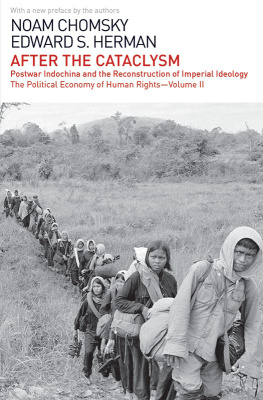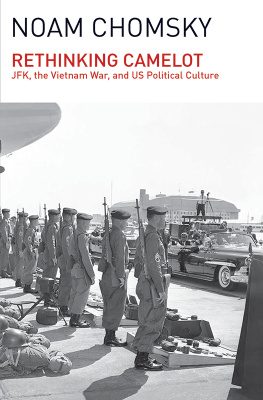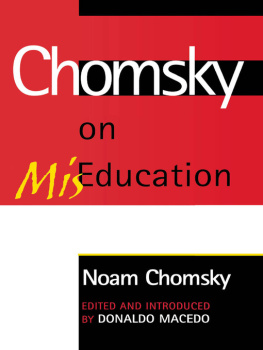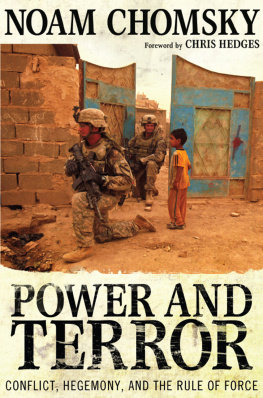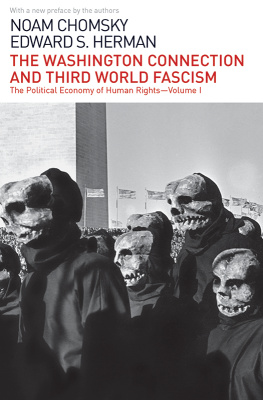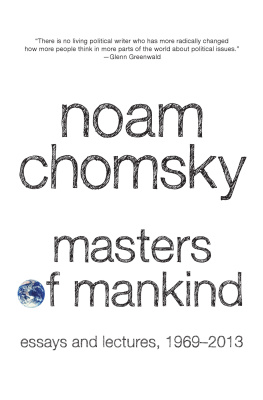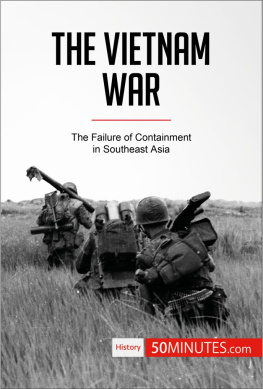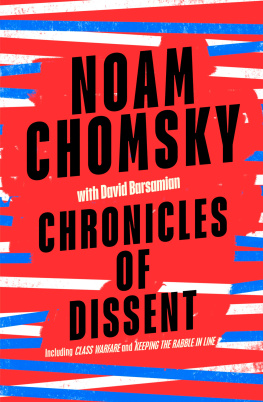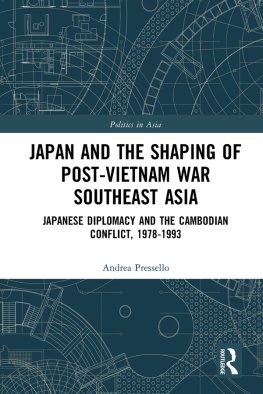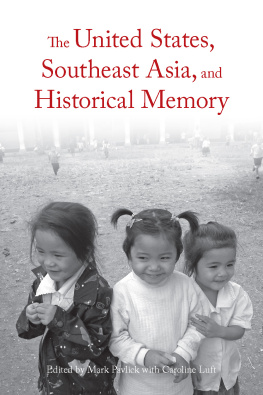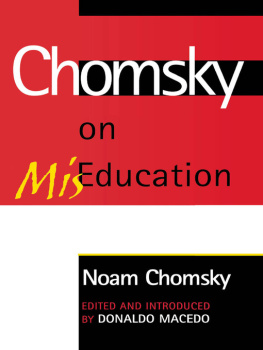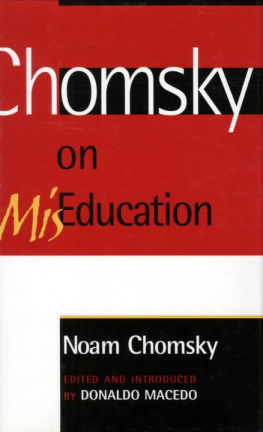Chomsky Noam - After the cataclysm: postwar Indochina and the reconstruction of imperial ideology
Here you can read online Chomsky Noam - After the cataclysm: postwar Indochina and the reconstruction of imperial ideology full text of the book (entire story) in english for free. Download pdf and epub, get meaning, cover and reviews about this ebook. City: Indochina;United States, year: 2014, publisher: Haymarket Books, genre: Politics. Description of the work, (preface) as well as reviews are available. Best literature library LitArk.com created for fans of good reading and offers a wide selection of genres:
Romance novel
Science fiction
Adventure
Detective
Science
History
Home and family
Prose
Art
Politics
Computer
Non-fiction
Religion
Business
Children
Humor
Choose a favorite category and find really read worthwhile books. Enjoy immersion in the world of imagination, feel the emotions of the characters or learn something new for yourself, make an fascinating discovery.
- Book:After the cataclysm: postwar Indochina and the reconstruction of imperial ideology
- Author:
- Publisher:Haymarket Books
- Genre:
- Year:2014
- City:Indochina;United States
- Rating:5 / 5
- Favourites:Add to favourites
- Your mark:
- 100
- 1
- 2
- 3
- 4
- 5
After the cataclysm: postwar Indochina and the reconstruction of imperial ideology: summary, description and annotation
We offer to read an annotation, description, summary or preface (depends on what the author of the book "After the cataclysm: postwar Indochina and the reconstruction of imperial ideology" wrote himself). If you haven't found the necessary information about the book — write in the comments, we will try to find it.
With a new preface by the authors, this companion book to The Washington Connection and Third World Fascism, dissects the aftermath of the war in Southeast Asia, the refugee problem, the Vietnam/Cambodia conflict and the Pol Pot regime.
After the cataclysm: postwar Indochina and the reconstruction of imperial ideology — read online for free the complete book (whole text) full work
Below is the text of the book, divided by pages. System saving the place of the last page read, allows you to conveniently read the book "After the cataclysm: postwar Indochina and the reconstruction of imperial ideology" online for free, without having to search again every time where you left off. Put a bookmark, and you can go to the page where you finished reading at any time.
Font size:
Interval:
Bookmark:
Contents
Haymarket Books
Chicago, Illinois
Noam Chomsky
and Edward S. Herman
After the Cataclysm:
Postwar Indochina and the Reconstruction of Imperial Ideology
Copyright 1979 by Noam Chomsky and Edward S. Herman
First Edition published by South End Press, Boston, Massachusetts
This edition published in 2014 by
Haymarket Books
P.O. Box 180165
Chicago, IL 60618
773-583-7884
www.haymarketbooks.org
info@haymarketbooks.org
ISBN: 978-1-60846-438-8
Trade distribution:
In the US, Consortium Book Sales and Distribution, www.cbsd.com
In Canada, Publishers Group Canada, www.pgcbooks.ca
In the UK, Turnaround Publisher Services, www.turnaround-uk.com
All other countries, Publishers Group Worldwide, www.pgw.com
This book was published with the generous support of Lannan Foundation and Wallace Action Fund.
Cover design by Josh On.
Library of Congress Cataloging-in-Publication data is available.
Preface to the 2014 Edition
Our study The Political Economy of Human Rights , originally published 25 years ago, consists of two volumes, closely interrelated. The first, entitled The Washington Connection and Third World Fascism , reviews the horrendous reign of terror, torture, violence and slaughter that Washington unleashed against much of the world in the 1960s and 1970s, primarily in the western hemisphere and Southeast Asia, including U.S. aggression in Indochina, surely the worst crime of the post-World War II era. The second volume, After the Cataclysm , reviews the immediate aftermath in Indochina along with some relevant but overlooked comparative and historical material.
As discussed in the preface to the original publication, the two volumes are devoted to both facts and beliefs: the facts insofar as they could be obtained, and beliefs arising from the way facts were selected and interpreted through the distorting prism of a very powerful ideological system, which gains much of its power from the belief that it is free and independent.
The earlier history of PEHR , reviewed in a prefatory note to the first volume, illustrates some of the interesting features of the doctrinal system. In brief, an earlier version was published by a small but successful publisher, owned by a major conglomerate. An executive of the conglomerate was offended by its contents, and in order to prevent its appearance shut down the publisher, effectively destroying all its stock. With very rare exceptions, civil libertarians in the U.S. saw no problem in these actions, presumably because control of expression by concentrated private power, as distinct from the state, is considered not only legitimate but even an exercise of freedom, in a perverse sense of freedom that finds a natural place in the prevailing radically anti-libertarian ideology (often called liberal or even libertarian, a matter that will not surprise readers of Orwell).
Elsewhere, we have discussed the general character of the doctrinal system more explicitly, reviewing its consequences in a wide array of domains.
One useful perspective on the ideological system is provided by a comparison of treatment by media and commentary of their crimes and our own both the reporting of the facts and the propaganda systems reaction to each. There was a highly revealing illustration at the time we were writing in 1977-78: the Indonesian invasion of East Timor in December 1975, and the Khmer Rouge takeover of Cambodia in April 1975. Our two longest and most detailed chapters review these two cases: East Timor in Volume I, Cambodia in Volume II.
In both cases, information was quite limited. In the case of East Timor, knowledge of the facts was limited by design: a good deal was quite accessible, including coverage in the Australian press. In the case of Cambodia, in contrast, reliable facts were very hard to obtain.
There was, however, extensive information about the second element of our inquiry: the belief systems that were constructed. In the case of East Timor, the U.S. reaction was brief: silence or denial. In the case of Cambodia, as we reviewed in detail, the reaction was unrestrained horror at the acts of unspeakable brutality, demonstrating the ultimate evil of the global enemy and its Marxist-Leninist doctrines.
The comparison is revealing. In both cases, it was clear that terrible crimes were in process, in the same area of the world, in the same years. There was one striking difference between the two cases. The crimes underway in Cambodia could be attributed to an official enemy (at least if U.S. actions, directly death-dealing and also helping lay the basis for further deaths are overlooked, as they were) and no one had a suggestion as to what might be done to mitigate or end them. In the case of East Timor, the crimes unequivocally traced back to Washington, which gave the green light for the invasion and provided critical military and diplomatic support for the vast atrocities (with the help of its allies), and they could have been ended very easily, simply by orders from Washington. That conclusion, never seriously in doubt, was demonstrated in September 1999, when President Clinton, under intense domestic and international pressure, quietly informed the Indonesian generals that the game was over. They instantly abandoned their strenuous claims to the territory and withdrew, allowing a UN peace-keeping force to enter. In a display of cynicism that mere words cannot capture, this was interpreted as a humanitarian intervention, a sign of the nobility of the West.
Our chapter on East Timor was far and away the most important in the two volumes, precisely because the huge ongoing crimes could have so readily been ended. It passed without mention in the doctrinal systemas, indeed, did our detailed review of many other U.S. crimes. In dramatic contrast, a sizable literature has been devoted to our chapter on Cambodia, desperately seeking to discover some error, and with unsupported and unjustifable claims about our alleged apologetics for Pol Pot. We reviewed those that were even mildly serious in Manufacturing Consent , and there should be no need to do so again.
While evidence about Cambodia in 1978 was slim, enough existed to make it clear, as we wrote, that the record of atrocities in Cambodia is substantial and often gruesome, with a fearful toll, though the available facts bore little relation to the huge chorus of denunciation of the genocidal Marxist rulers. Not all joined in the chorus, including some of the most knowledgeable and respected correspondents, among them Nayan Chanda of the Far Eastern Economic Review . The most striking exceptions were the few people who actually had some significant information about what was happening: the State Department Cambodia specialists, who stressed the limited nature of evidence available at the time we wrote and estimated that deaths from all causes were probably in the tens if not hundreds of thousands, largely from disease, malnutrition, and brutal, rapid change, not mass genocide.
Such sources, however, were not useful for the task of ideological reconstruction, so they were ignored. And the tasks were serious ones. One crucial task was to suppress the hideous crimes that the U.S. had committed in Indochina, and even justify them by invoking the catastrophe when the U.S. finally withdrew. That includes Cambodia, where the U.S. air force executed Henry Kissingers orders (originating with Nixon) for A massive bombing campaign in Cambodia. Anything that flies on anything that moves in rural Cambodia. A related task was to turn the anti-war movement into the guilty parties by charging them with denying enemy crimes and even for preventing (non-existent) Western efforts to overcome them. Amazingly, Western intellectuals even rose to these demands.
When some information about East Timor finally seeped through the ideological filters, it became necessary to explain why the U.S. government had been so fully engaged in these terrible crimeswhich went on through 1999and why the Free Press had failed to bring them to public attention while focusing attention on crimes of the official enemy that were beyond our control. The obvious explanation, confirmed in innumerable other cases, could not be accepted. A more structurally serious explanation was offered by the respected correspondent William Shawcross: a comparative lack of sources and lack of access to refugees. In short, the extensive information in the Australian media was unavailable to Western journalists in comparison to the very scattered data about Cambodia; and it is far more difficult to travel to Lisbon or Melbourne to interview the thousands of refugees there than to trek through the jungle on the Thai-Cambodia border.
Next pageFont size:
Interval:
Bookmark:
Similar books «After the cataclysm: postwar Indochina and the reconstruction of imperial ideology»
Look at similar books to After the cataclysm: postwar Indochina and the reconstruction of imperial ideology. We have selected literature similar in name and meaning in the hope of providing readers with more options to find new, interesting, not yet read works.
Discussion, reviews of the book After the cataclysm: postwar Indochina and the reconstruction of imperial ideology and just readers' own opinions. Leave your comments, write what you think about the work, its meaning or the main characters. Specify what exactly you liked and what you didn't like, and why you think so.

